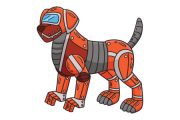Paul (alias ‘Pancho’) Price, house-proud like his neighbours on either side, surveyed with distaste the dandelions on his short front lawn, shaking his head not only at the evident ineffectiveness of the weedkiller he had recently bought, but also at his own apparent failure, as the son of a gardener, to control his own lawn. He headed for the garage to look for an implement to dig each weed out, but was stopped short by the sight of a Cadillac with New York plates crawling towards him on the wrong side of the street. Its driver, a young man with a sheepish uncertain grin, looked lost. He prepared to speak out of his open window, but a large woman on the passenger side of the car leaned over him and called out, “What’s that noise?”
“What noise?” Paul could hear no unusual sound.
“That swish-swish. What’s making it?” She sounded annoyed. Paul came closer. There were two elderly women in the back seat looking anxious. The overbearing woman in front frowned.
“Can’t you hear it? Is it machinery? Swish-swish-swish! From behind you?”
“Oh, that’s the sound of the Circular,” smiled Paul. The woman’s frown deepened. “The what?”
“The Circular Highway. One block over. A ring road. Six lanes of traffic. We are used to it; we don’t hear it now.”
“You don’t hear it?” She was incredulous. “You live with that?”
“It used to be worse,” admitted Paul. “Trucks would bang over the expansion joints after winter did its worst, but now we’re thank–”
“ Could you live with that, Irving?” The driver raised his hands, looking helpless.
“Irving is used to fine living. He’s a doctor! Just graduated. ‘Summercumloudly!’ That’s Latin.”
We’re looking for a house for him, near your hospital just blocks away. So he can walk to work.” She beamed with satisfaction, turning around for the approbation of her travelling companions, both of whom nodded enthusiastically, like marionettes. “We’re so proud of him. Irving’s going to get married soon. He’s picked his wife. He’ll need a bigger house than these,” pointing to Paul’s and his neighbours’ homes. “When he has children. They told us,” she sniffed, “that this was a high-class area. But not with these houses. Do you have kids?” This question was, like the others, grossly impertinent and insultingly intrusive, but Paul answered civilly.
“They’re no longer children. Why do you ask?”
“No reason. It’s a small house. Two bedrooms? Three?”
Paul drew his breath in sharply. He made an effort to show forbearance. “We had four children here.” He looked at her critically. “It was a good home for us. And it still is.”
“You married?”
“That is an offensively personal question, but I am a widower of several years’ standing.”
The woman paused, shrugged, and changed the subject.
“Did I tell you Irving is a surgeon? Top of his class! Gave the med school valedik-story, din’t he?” As if on cue, the two in the back smiled and clapped. Monkey see, thought Paul. He put his hands on the car door, leaned forward. Looking Irving in the eye, he said, “Good luck, Irving. You’re going to need it.” He stepped back from the car.





